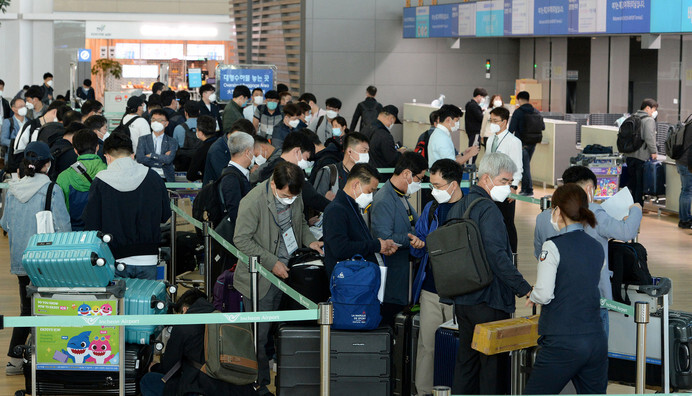hankyoreh
Links to other country sites 다른 나라 사이트 링크
S. Korea, China to adopt fast track entry for business travelers who’ve tested negative for COVID-19

South Korea and China have agreed to adopt a “fast track” system exempting businesspeople from a mandatory 14-day quarantine upon arrival if they have tested negative for the novel coronavirus, the South Korean Ministry of Foreign Affairs (MOFA) announced on Apr. 29. The agreement is the first example of systematic exceptions being granted for international travel at a time when countries around the world are imposing entry restrictions amid the virus pandemic.
The “fast track” procedures agreed upon by the two sides will apply to 10 regions within China and go into effect as of May 1. The 10 regions in question -- which include the cities of Shanghai, Tianjin, and Chongqing and the provinces of Liaoning, Shandong, Jiangsu, Guangdong, Shanxi, Sichuan, and Anhui -- are places with large amounts of interaction between South Korean and Chinese businesses, MOFA explained.
But with regular air routes only available for Shanghai, Liaoning, Shandong, Jiangsu, and Anhui, the fast track system will really only be applied to those five regions for the time being. According to some observers, the omission of the capital city of Beijing raises questions over whether the effects will live up to expectations.
Travelers need to test negative 72 hours prior to flight
South Korean businesspeople hoping to visit one of these regions in China will need to have an invitation issued by a Chinese local government, as well as a visa issued by the Chinese Embassy or a Chinese consulate in South Korea. They will also need to test negative for COVID-19 by a healthcare institution designated by the Ministry of Health and Welfare (MOHW) within a 72-hour period prior to their flight’s departure. Upon arrival in China, they will be isolated for one to two days in a location designated by a local Chinese government, where they are to be tested for the virus again.
China has been effectively banning international arrival since Mar. 28 amid an increase in imported virus cases. A MOFA official said, “Through this generalization of exceptional entry procedures for South Korean businesspeople, which had previously been approached on a case-by-case basis, we are anticipating that economic activities within China can be guaranteed for a larger number of South Korean businesspeople, including those representing SMEs and middle-market companies.”
By Kim So-youn and Noh Ji-won, staff reporters
Please direct comments or questions to [english@hani.co.kr]

Editorial・opinion
![[Column] Season 2 of special prosecutor probe may be coming to Korea soon [Column] Season 2 of special prosecutor probe may be coming to Korea soon](https://flexible.img.hani.co.kr/flexible/normal/500/300/imgdb/original/2024/0426/3317141030699447.jpg) [Column] Season 2 of special prosecutor probe may be coming to Korea soon
[Column] Season 2 of special prosecutor probe may be coming to Korea soon![[Column] Park Geun-hye déjà vu in Yoon Suk-yeol [Column] Park Geun-hye déjà vu in Yoon Suk-yeol](https://flexible.img.hani.co.kr/flexible/normal/500/300/imgdb/original/2024/0424/651713945113788.jpg) [Column] Park Geun-hye déjà vu in Yoon Suk-yeol
[Column] Park Geun-hye déjà vu in Yoon Suk-yeol- [Editorial] New weight of N. Korea’s nuclear threats makes dialogue all the more urgent
- [Guest essay] The real reason Korea’s new right wants to dub Rhee a founding father
- [Column] ‘Choson’: Is it time we start referring to N. Korea in its own terms?
- [Editorial] Japan’s rewriting of history with Korea has gone too far
- [Column] The president’s questionable capacity for dialogue
- [Column] Are chaebol firms just pizza pies for families to divvy up as they please?
- [Column] Has Korea, too, crossed the Rubicon on China?
- [Correspondent’s column] In Japan’s alliance with US, echoes of its past alliances with UK
Most viewed articles
- 1[Column] Season 2 of special prosecutor probe may be coming to Korea soon
- 2‘We must say no’: Seoul defense chief on Korean, USFK involvement in hypothetical Taiwan crisis
- 3Is N. Korea threatening to test nukes in response to possible new US-led sanctions body?
- 4Amnesty notes ‘erosion’ of freedom of expression in Korea in annual human rights report
- 5Division commander ordered troops to enter raging flood waters before Marine died, survivor says
- 6N. Korean delegation’s trip to Iran shows how Pyongyang is leveraging ties with Moscow
- 7[Editorial] Korea’s surprise Q1 growth requires objective assessment, not blind fanfare
- 8Is Japan about to snatch control of Line messenger from Korea’s Naver?
- 9No good, very bad game for Korea puts it out of Olympics for first time since 1988
- 10[Reportage] On US campuses, student risk arrest as they call for divestment from Israel